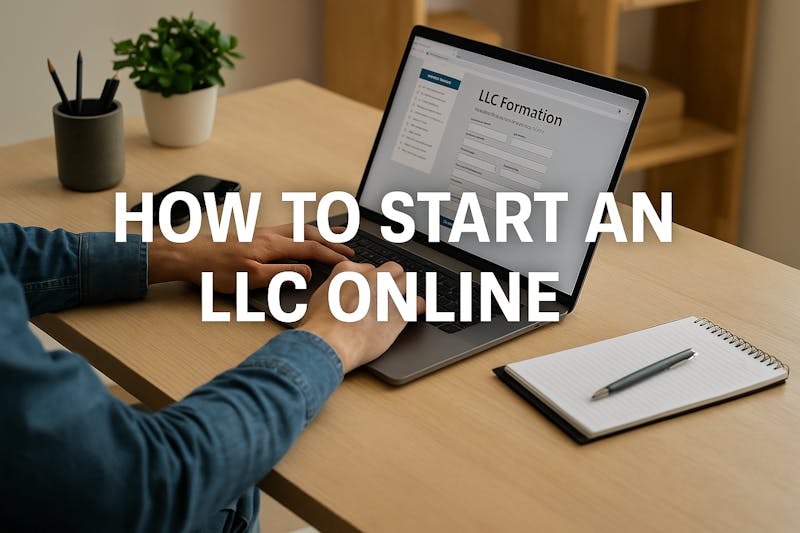LLCs separate personal and business assets and offer flexible taxation (default pass-through, with optional S-corp/C-corp elections).
Choose your home/operating state unless you have a clear reason to form elsewhere; otherwise you may need foreign qualification and duplicate compliance.
Online formation is straightforward if you follow the steps: name, registered agent, Articles of Organization, and post-registration tasks.
Understanding LLC
A Limited Liability Company (LLC) is a state-chartered entity that protects owners (“members”) from most business liabilities and is taxed by default as a pass-through (members report profits/losses on personal returns).
You can elect S-corporation or C-corporation treatment if that better fits compensation or reinvestment goals.
For multi-member LLCs, the default tax classification is a partnership; for single-member LLCs, a disregarded entity.
An election under IRS Form 8832 or IRS Form 2553 can convert to corporate or S-corp status.
In an S-corporation election, owner-employees must receive reasonable W-2 wages, while the remaining profits are distributed as dividends.
C-corp LLCs may also pay dividends in addition to salaries to shareholder-employees.
Compensation note: In a default-taxed LLC, members typically take distributions or guaranteed payments.
Different Types of LLC
Choosing the right LLC structure helps align liability, management, and tax options with your goals.
1. Single-Member LLC (SMLLC)
One owner. Simple governance; by default taxed as a disregarded entity. (See tax refresher above for elections.)
2. Multi-Member LLC
Two or more owners. Default partnership taxation.
Management can be member-managed (all owners run the business) or manager-managed (appointed managers).
3. L3C (Low-Profit LLC)
Mission-first variant recognized in a handful of states (e.g., Vermont, Wyoming, Illinois, Michigan).
Operates like an LLC but designed to attract program-related investments.
4. Series LLC
A “parent” with separate series/cells that isolate assets and liabilities.
Available only in certain states (e.g., Delaware, Illinois, Nevada, Texas, Tennessee, Utah).
Confirm bank/insurer acceptance before choosing this format.
Series LLCs are not uniformly recognized for federal tax purposes; the IRS evaluates each series case by case.
5. PLLC (Professional LLC)
For licensed professions (e.g., doctors, lawyers, architects, accountants) in states that allow it.
A PLLC doesn’t shield members from personal malpractice—only from general business debts.
6. Restricted LLC (Nevada only)
Estate-planning tool that prohibits distributions for 10 years after formation (must be designated in the Articles of Organization). Not tax-exempt.
7. Privacy-Focused (“Anonymous”) Filing
Some states (e.g., Delaware, Nevada, New Mexico, Wyoming) keep owners off public filings (registered agent shown instead). This protects public anonymity but not regulatory disclosure obligations.
For federal and banking disclosures, see the privacy/BOI note in Step 1.
How to Set Up Your LLC Online
Starting a Limited Liability Company (LLC) online can be simple if each step is followed carefully. Below are five key steps to help guide someone through registering an LLC remotely.
Step 1: Choose the Right State to Start the LLC
Pick the state that best fits how and where you will actually operate (online, physical location, or both).
If you form in one state but do business in another, you’ll usually need foreign qualification in the operating state (extra filings, agent, and fees).
For Delaware, note strong case law, no sales tax, and a flat LLC tax of $300 due June 1; late payment triggers a $200 penalty + 1.5% per month interest.
Also remember Delaware’s separate Gross Receipts Tax on business receipts (a business-level tax distinct from sales tax).
For online businesses, factor sales/use tax nexus and compliance; for holding or location-agnostic entities, compare total maintenance (annual/biennial reports, franchise/gross-receipts taxes, agent).
For Arizona LLCs, there is no annual report, but most counties require a newspaper publication of formation (addresses in Maricopa or Pima are exempt because the Commission posts online).
States like Delaware, Wyoming, New Mexico, and Nevada generally keep owners off public filings (registered agent appears instead). However, under FinCEN’s March 26 2025 interim rule, domestic U.S. reporting companies are temporarily exempt from BOI filing pending final regulations, while foreign reporting companies must still report under the revised deadlines. Always check FinCEN’s current guidance for updates.
To help you plan, here are the initial filing fee and recurring fee figures you provided (keep in mind states update fees).
| State | Filing Fee | Annual/Biennial Fee | Notes |
|---|---|---|---|
| Alabama | $200 | $50/year | — |
| Alaska | $250 | $100 every 2 years | — |
| Arizona | $50 | $0 | No annual LLC report; most counties require newspaper publication (Maricopa/Pima exempt via online posting). |
| Arkansas | $45 | $150/year | — |
| California | $70 | $800/year + $20 every 2 years | — |
| Colorado | $50 | $25/year | — |
| Connecticut | $120 | $80/year | — |
| Delaware | $110 | $300/year | LLC tax due June 1; late = $200 penalty + 1.5%/month interest. Gross Receipts Tax may apply to business receipts. |
| Florida | $125 | $138.75/year | Annual report due May 1; after May 1 late fee applies. |
| Georgia | $100 | $50/year | — |
| Hawaii | $50 | $15/year | — |
| Idaho | $100 | $0 (info report required) | — |
| Illinois | $150 | $75/year | — |
| Indiana | $95 | $31 every 2 years | — |
| Iowa | $50 | $30 every 2 years | — |
| Kansas | $160 | $50/year | — |
| Kentucky | $40 | $15/year | — |
| Louisiana | $100 | $35/year | — |
| Maine | $175 | $85/year | — |
| Maryland | $100 | $300/year | Annual report (SDAT) typically due April 15. |
| Massachusetts | $500 | $500/year | — |
| Michigan | $50 | $25/year | — |
| Minnesota | $155 | $0 (info report required) | — |
| Mississippi | $50 | $0 (info report required) | — |
| Missouri | $50 | $0 | — |
| Montana | $35 | $20/year | — |
| Nebraska | $100 | $13 every 2 years | Due Apr 1 in odd years; delinquent date varies by page (June 1 or June 16—state site lists both; local practice accepts June 16). |
| Nevada | $425 | $350/year | $425 is the combined state business license + initial list typical at formation. |
| New Hampshire | $100 | $100/year | — |
| New Jersey | $125 | $75/year | — |
| New Mexico | $50 | $0 | No annual LLC report. |
| New York | $200 | $9 every 2 years | Biennial statement $9; separate LLC publication requirement applies after formation. |
| North Carolina | $125 | $200/year | — |
| North Dakota | $135 | $50/year | — |
| Ohio | $99 | $0 | No annual report for LLCs. |
| Oklahoma | $100 | $25/year | — |
| Oregon | $100 | $100/year | — |
| Pennsylvania | $125 | $7/year | New annual report regime; LLCs due Sept 30. |
| Rhode Island | $150 | $50/year | — |
| South Carolina | $110 | $0 | Unless taxed as S-Corp. |
| South Dakota | $150 | $50/year | — |
| Tennessee | $300 | $300/year | — |
| Texas | $300 | $0 | PIR/OIR required; no-tax-due threshold $2.47M, no “No-Tax-Due Report” filing. |
| Utah | $59 | $18/year | — |
| Vermont | $155 | $45/year | — |
| Virginia | $100 | $50/year | — |
| Washington | $200 | $60/year | — |
| Washington DC | $99 | $300 every 2 years | Biennial report. |
| West Virginia | $100 | $25/year | — |
| Wisconsin | $130 | $25/year | — |
| Wyoming | $100 | $60 minimum/year | Annual license tax based on WY assets; minimum $60. |
Don’t pick a state just because it’s cheaper. If you operate your business from another state, you might end up paying double to stay compliant.
Step 2: Pick a Business Name
Your entity name (legal name) must be available in the state, include a designator (e.g., LLC or L.L.C.), and avoid restricted terms (e.g., bank, university) without approvals.
A DBA (Doing Business As) is for branding under a different public name and must also be registered where required.
Step 3: Appoint a Registered Agent
Most states require a registered agent with a physical in-state address who is available during business hours to accept service of process and official mail. Some states maintain lists of commercial registered agents; owners can serve as their own agent if they meet the rules.
Step 4: File the Articles of Organization
File the Articles of Organization (sometimes called Certificate of Formation/Organization) with the Secretary of State (or equivalent). Forms vary by state but typically include:
- LLC legal name and principal address
- Registered agent name and street address
- Management type (member-managed or manager-managed)
- Organizer signature; some states request purpose/duration and may request member/manager info
Once filed, the state reviews your submission and will contact the registered agent if anything is missing.
Step 5: Complete Post-Registration Tasks
- Operating Agreement (strongly recommended): governance, capital, voting, distributions, exits.
- EIN (Employer Identification Number) via the IRS (needed for banking/taxes).
- Licenses/permits (local/professional/industry).
- Open a business bank account (keep funds separate).
- Compliance calendar: know annual/biennial reports, any franchise or gross-receipts taxes, and local filings. For Delaware LLCs, the flat $300 tax is due June 1; late = $200 penalty + 1.5%/month interest. For Texas, entities at/under $2.47M revenue still file PIR/OIR even though no tax is due.
Per FinCEN’s March 26 2025 interim rule, domestic U.S. companies are temporarily exempt from BOI reporting pending new regulations; foreign reporting companies must continue reporting on revised deadlines.
Pros of LLC
Personal Asset Protection
An LLC separates business liabilities from owners (“members”). If the company is sued or owes debts, members are generally not personally liable. Liability protection does not extend to personal guarantees, torts, or statutory obligations. Protection can also be lost if you commit fraud, commingle funds, or personally guarantee debts.
Easy to Set Up
Most states let you file online; approvals often come within a few business days (mail can take longer). You’ll also handle basics like a registered agent, Articles of Organization, and any local licenses/permits.
Builds Trust and Credibility
Forming an entity signals permanence and governance. Vendors, customers, and many lenders view registered entities as more established than sole proprietorships.
Access to Funding
Banks and many small-business lenders are comfortable with LLCs. However, some venture capital and institutional investors prefer Delaware C-corporations for stock/equity mechanics. If high-growth VC funding is your goal, factor this into your choice.
Flexible Tax Treatment
By default, a single-member LLC is a disregarded entity and a multi-member LLC is taxed as a partnership (pass-through). You may elect S-corporation or C-corporation status if it better fits compensation or reinvestment.
It’s not universally true that “LLCs don’t pay federal corporate income tax.” An LLC that elects C-corp treatment does pay corporate income tax.
Cons of LLC
Start-Up and Ongoing Costs
State formation fees typically range from about $40 to $500+ (some states effectively higher once initial lists/business licenses are added). Expect annual or biennial reports and, in some states, franchise or gross-receipts taxes. Other possible costs:
- Name reservation (optional in many states)
- Registered agent service
- Publication (required in a few jurisdictions)
- Annual report filing fees
Limited Protection in Certain Cases
Courts can “pierce the veil” if you:
- Commit fraud or abuse the entity
- Fail to pay required taxes
- Commingle business and personal funds
- Personally guarantee a debt (you’re liable on your guarantee)
Good hygiene: separate bank accounts, written Operating Agreement, accurate books, and timely filings.
More Administration Than a Sole Proprietorship
LLCs have fewer formalities than corporations, but multi-member LLCs still need an Operating Agreement, proper bookkeeping, and Schedule K-1s for members.
You must track state report deadlines and any franchise/gross-receipts obligations.
Dissolution Takes Work
Shutting down requires formal steps, which vary by state, typically including:
- Member approval per the Operating Agreement
- Filing Articles/Certificate of Dissolution/Termination with the state
- Notifying creditors and settling debts
- Filing final federal/state/local tax returns (some states require tax clearance)
- Distributing remaining assets per the Operating Agreement
Why an Online LLC Registration Might Be Rejected
- Name conflict or missing designator (LLC/L.L.C.) or using restricted words (e.g., bank, university, insurance) without approvals.
- Articles of Organization incomplete, wrong management type (member- vs manager-managed), or missing organizer signature.
- Registered agent issues: ineligible, no physical in-state address (P.O. box not allowed), or no agent consent where required.
- Wrong fee paid, payment failure, or filing under the wrong entity type.
- Foreign qualification skipped in the state where you actually do business (you formed elsewhere).
- Publication requirement missed where applicable (e.g., Arizona counties that require newspaper publication; New York LLC publication after formation).
- Address problems: invalid principal office/agent address or missing required contact details.
- Professional/PLLC filings missing board approvals or license validations in states that require them.
Ready to launch your business the smart way? Let Air Corporate handle the paperwork for you. From LLC formation to banking and tax support, Air Corporate offers all-in-one solutions to simplify your startup journey.
FAQs
Often helpful for liability protection and tax flexibility, but not legally required for every small business.
Business owners can start an LLC online through the Secretary of State’s website by handling the process themselves. While this option may seem simple, lacking experience can lead to costly mistakes or delays.
Many people prefer to use a trusted third-party service. These professionals handle the paperwork and legal steps, allowing the owner to focus on starting and growing the business without the stress.
Online approvals can be same-day to a few business days, depending on the state’s processing time. If the paperwork is mailed, it may take a few weeks or longer.






